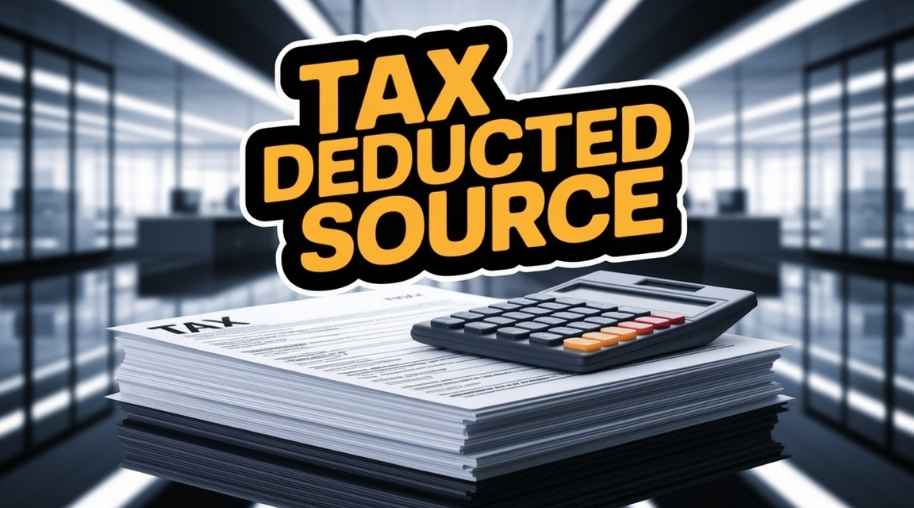TDS Full Form-Tax Deducted at Source
by Shashi Gaherwar
0 2361
Tax Deducted at Source (TDS): Meaning, Applicability, and Compliance Guide
Tax Deducted at Source (TDS) is a tax collection mechanism introduced by governments to ensure timely tax payments and prevent tax evasion. Under this system, the payer deducts tax before making certain payments and deposits it with the tax authorities. TDS applies to salaries, interest, rent, professional fees, and other specified transactions.

Understanding TDS applicability, rates, compliance, and refund procedures is crucial for businesses, salaried individuals, and freelancers to avoid penalties and ensure smooth tax compliance.
What is Tax Deducted at Source (TDS)?
TDS is a form of advance tax collection wherein the tax is deducted at the time of payment instead of at the end of the financial year. It applies to:
- Salaries and Wages: Tax deducted from employees’ salaries based on applicable tax slabs.
- Interest on Fixed Deposits (FDs) and Loans: Tax on interest income exceeding specified thresholds.
- Commission and Professional Fees: Payments to professionals or agents.
- Rent Payments: Tax on rent exceeding government-defined limits.
- Contractor Payments: Tax on payments to contractors or subcontractors.
The deducted tax is deposited with the government and reflected in the recipient’s income tax records.
Applicability of TDS
TDS applies to individuals, businesses, and organizations making payments exceeding prescribed limits. Key applicability criteria include:
- Salaries: Employers deduct TDS from employees’ salaries as per their applicable income tax slab rates.
- Interest Income: Banks deduct TDS on interest earned on fixed deposits exceeding a specified threshold.
- Rent Payments: TDS applies to rent payments exceeding the government-defined limit.
- Professional Fees: Payments to professionals such as doctors, lawyers, and consultants attract TDS.
- Commission and Brokerage: Any commission paid to agents, brokers, or intermediaries is subject to TDS.
TDS Rates on Common Transactions
TDS rates vary depending on the nature of the payment and government regulations. Common rates include:
- Salary Income: As per applicable income tax slab.
- Interest on Fixed Deposits: 10%.
- Rent (for Individuals): 5%.
- Rent (for Companies): 10%.
- Professional Fees: 10%.
- Contractor Payments: 1% (Individuals), 2% (Companies).
- Commission/Brokerage: 5%.
(Note: TDS rates may vary based on government amendments and tax residency status.)
TDS Deduction and Deposit Process
The TDS process involves the following steps:
- Deduction of TDS: The payer calculates and deducts TDS when making payments.
- Deposit with Government: The deducted TDS amount must be deposited with the tax department using Challan No. ITNS 281 before the due date.
- Filing of TDS Returns: The payer must file a TDS return (Forms 24Q, 26Q, or 27Q, depending on transaction type) quarterly with details of deductions.
- TDS Certificate Issuance: After filing returns, the deductor provides a TDS certificate (Form 16 or Form 16A) to the payee.
How to Claim TDS Refund?
If TDS has been deducted in excess of the actual tax liability, individuals can claim a refund by following these steps:
- File Income Tax Return (ITR): Report total income and TDS deductions in the annual ITR.
- Verify Tax Credit (Form 26AS): Ensure the deducted TDS reflects correctly in Form 26AS.
- Submit Refund Claim: If total tax liability is lower than TDS paid, the excess amount is refunded after tax assessment.
- Receive Refund: If approved, the tax department processes and credits the refund directly to the taxpayer’s bank account.
Consequences of TDS Non-Compliance
Failing to deduct or deposit TDS can lead to penalties, including:
- Interest on Late Deduction/Deposit: 1-1.5% per month on the TDS amount.
- Penalty for Non-Payment: A penalty equal to the TDS amount may be imposed.
- Disallowance of Expense: Businesses may lose tax benefits on expenses where TDS was not deducted.
- Legal Action: In extreme cases, legal proceedings may be initiated for non-compliance.
Exemptions and Lower TDS Deductions
In certain cases, taxpayers can apply for a lower or nil TDS deduction:
- Submission of Form 15G/15H: Individuals with income below taxable limits can submit these forms to banks to prevent TDS deduction.
- Application under Section 197: Businesses or individuals expecting a lower tax liability can apply to the tax department for a lower TDS certificate.
TDS vs. Advance Tax
Key differences between TDS and advance tax include:
- Who Deducts?: TDS is deducted by the payer; advance tax is paid by the taxpayer.
- When is it Paid?: TDS is deducted at the time of payment; advance tax is paid in quarterly installments.
- Applicable to: TDS applies to salaries, rent, interest, and fees; advance tax applies to business income and capital gains.
- Refund Possibility: TDS allows refunds if excess tax is deducted; advance tax refunds are limited to overpayment cases.
Future Trends in TDS Compliance
Emerging trends in TDS compliance include:
- Increased Digitization of Tax Processes: Governments are adopting digital tax filing systems, reducing manual paperwork for TDS compliance.
- AI and Automation in TDS Calculations: Tax authorities are leveraging AI to auto-detect TDS mismatches and prevent tax evasion.
- Stricter Monitoring of TDS Defaults: More stringent penalties and audits are expected to improve tax compliance.
- International TDS Regulations: Cross-border payments are seeing increased TDS scrutiny to prevent double taxation.
Tax Deducted at Source (TDS) is an essential part of tax compliance, ensuring timely tax collection and reducing tax evasion. Understanding TDS applicability, rates, filing procedures, and refund claims can help individuals and businesses maintain seamless tax compliance while avoiding penalties. With growing digitization and automation, TDS compliance is becoming easier and more transparent, benefiting both taxpayers and the government.
Further Learning Resources
If you’re passionate about building a successful blogging website, check out this helpful guide at Coding Tag – How to Start a Successful Blog. It offers practical steps and expert tips to kickstart your blogging journey!
For dedicated UPSC exam preparation, we highly recommend visiting www.iasmania.com. It offers well-structured resources, current affairs, and subject-wise notes tailored specifically for aspirants. Start your journey today!

Share:









Comments
Waiting for your comments